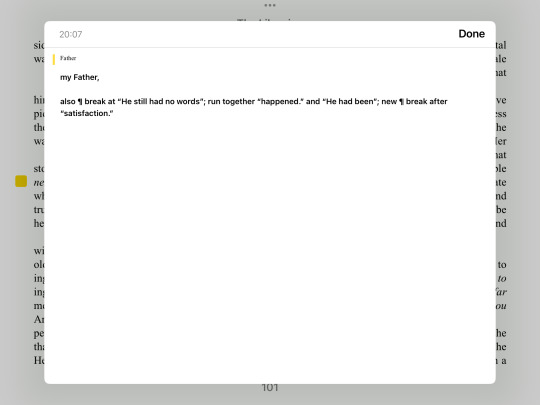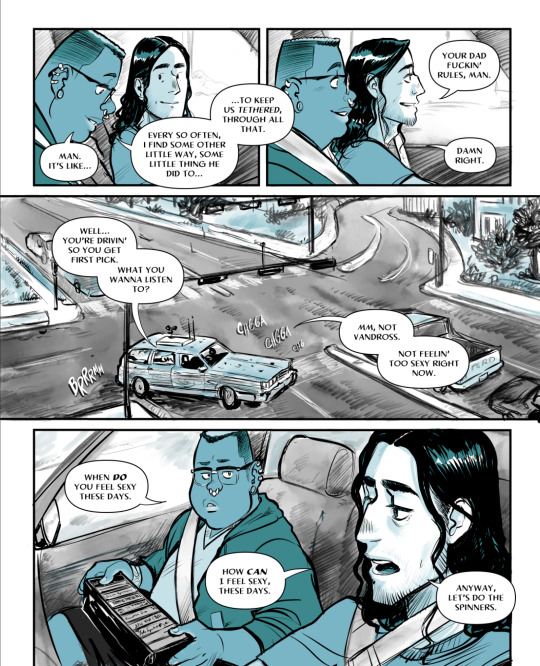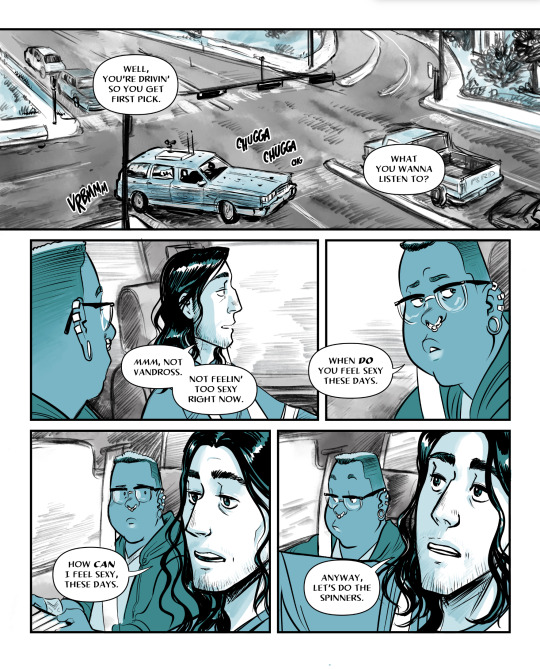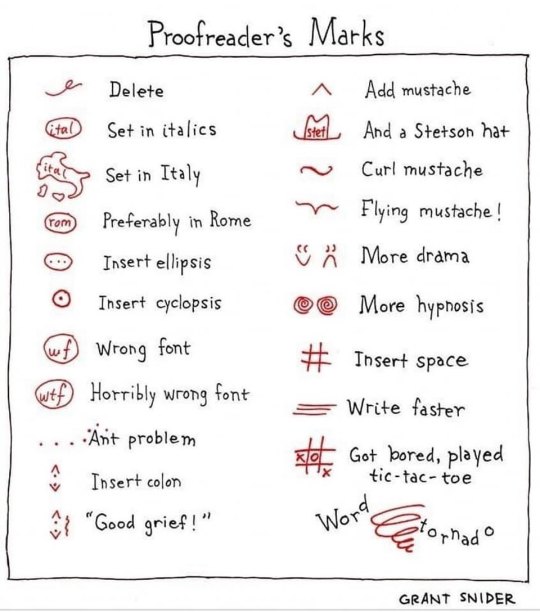#revisions
Note
Hope this isn't an ask you get all the time, but how do you track your progress when you're doing editing?
Everyone talks about word goals, and that seems fine for a first draft, but doesn't make sense to me when it comes to revisions. Do you have any kind of system for setting daily goals for your revisions?
Actually, I don't think anyone's ever asked me about this. :) So no sweat.
Briefly: I think you're wise in not attempting wordcounting in this phase of dealing with an MS—or trying to push yourself into a structure so rigid. ...There's this, too: there's a whole lot too much emphasis out there at the moment on trying to force yourself into other people's writing and editing paradigms—so many of them riddled with bar graphs and "demonstrable" daily progress. You need to find what works for you. More words dealt with in a day, sure, that's encouraging in its way. But are they the right words?
Today’s Writer Take that will probably strike some as Hot (and ask me if I care): Some kinds of writing progress are just neither graphically nor numerically quantifiable. And damned to the least TripAdvisorally-acceptable regions of [insert your preferred underworld here] be those who’ve tried to sell people the idea that they are.
(sigh)
Now, for what it's worth: here's how I do it. Which may be useful to other people, or not so much so. And that's fine, because I'm not editing their novels. :)
(Adding a break here. Under the cut: advice + advice = advice, and some images of text I shouldn't be letting y'all see just yet... but WTF.)
Revision for me is a fairly relaxed business—unless my editor has told me WE NEED THIS ON TUESDAY, which thank sweet Thoth on his e-bike is very rare.
It also helps that I like revising. (When I was a kid, I liked liver, too. And spinach. Just call me Miss Outlier and let's move on.) I really enjoy the feeling of the work’s rough edges being filed down and the sparse places being filled out.
And also: second draft/first revision draft is nowhere near as tense for me as first draft. Because, thank God, at least there's a book.
First draft is where I sweat blood and otherwise suffer. While I can see the story just fine in my head, it's not really real for me until the first draft, whole in narrative and action, is complete on paper/in the machine. And till it's achieved at least that level of reality, I can't relax.
But by the time I hit my second/revision draft, I can be confident that any really serious problems in the novel have already been solved—because I'm an outliner. In the outline stage, potential thematic or structural troubles will routinely have revealed themselves way long ago: before drafting even got started, as I first wired the story's bones together. The successfully-executed first draft acts as proof-of-concept for that structural wiring. By the time that draft’s done, it’s immediately apparent whether the skeleton can successfully stand up by itself. And gods is that a relief when it does! You’re tempted to jump around yelling “It's aliiiiiive!" as the lightning strikes around you.*
However, if after submitting that draft my editor's found something structurally or thematically troublesome in it that I've completely missed until this point, my first order of business becomes to fix whatever their notes involve and submit the fixes. Nothing further happens until the editor sees what I've done about those problems, and until I get agreement that whatever intervention I've enacted has now sorted the problems out.
After that, everything happens in bed.
(...casually noting that for a line to use somewhere else...) :)
But seriously: I do my best revision and editing before getting up in the morning.
Some of this is because, for me, the mind's nice and quiet and (theoretically) at least moderately well rested, right after sleep. I might take the briefest glance at my email first to make sure nothing urgent needs attention... but once that’s done, I refuse to let myself go any further down that hole. That early-morning calm is a mental state I'm glad to exploit, and one I jealously guard. On days when I'm forced to do without the working lie-in**, I use a different approach: when there's a pause, sit down and do nothing—no reading, no video, no music, no phone, nothing—for half an hour: then start editing. Routinely, the quiet I need will once more have fallen.
The in-bed-editing approach also works for me because (since I'm working in Scrivener) it's absolutely no big deal to finish a day's editing on a file by exporting a version of the file containing the day's edits to ebook format, and into my Dropbox. From there, in the morning, without ever getting out from under the covers, I can pull that .epub file into my tablet and read it as an ebook, making corrections and notes there.
This is what it looks like (on a page without too many corrections) if the app you're using is "Books" in an iPad. The second image is what you get when you touch on the marginal yellow square of the note to examine it.


Then, when I'm finished looking over the previous day's/evening's writing and adding notes to it, I go downstairs, get some caffeine in me, and make the changes in the main Scrivener file. (If I was running the project in question on the iPad version of Scrivener, I'd just make the change right there. But who knows when I'd actually get up, then? Better to do it this way.) :)
In the normal flow of things I'll attempt to deal with a chapter or two a day in this mode. (Always bearing in mind that my chapters in early drafts typically run long—often 10K or so—and I'm likely enough to rebreak them later.) This first level of revision is the easy one: catching typos and bad or clumsy phrasings, reworking character interactions that need smoothing out; adding better descriptive passages (with particular emphasis on staying in the visual, audio and tactile senses), etc., etc.
So again: no way I'd ever bother worrying about word counts, with these. What seems to count for more is giving yourself time to recognize, gradually, at a reader's pace, what's working in the prose and what isn't. Rush—or try to force the pace to a given number of words per day—and you run the risk of missing something vital. To me, at the tracking level, it seems sufficient to note which chapters have been dealt with, and which are still hanging fire. (I can change the chapters' color labels in Scrivener to make this status visible at a glance, if I need to.)
When everything's dealt with on this pass—which if I'm lucky will take no more than a couple/few weeks—I try to take a couple weeks off before dealing with the MS again. Sometimes that's possible: sometimes not. The longer you can leave the book alone to let your perceptions of it rest and reset themselves, the better. Distance—mental or temporal—seems to lend clarity.
In any case, for me, next comes another pass, tougher to describe. Casually, I refer to it as the "Missed Opportunities/Complications" pass. This is a thing that one of the very best writers I know, John M. Ford, used to do. One of his editors (I think it was) came across him working on an MS one time, and asked him what he was doing. "Complications," Mike muttered. "Removing them?" said his editor. Mike shook his head. "Adding them," he said.
In this pass you look for in-novel connections you've previously missed making. Some dramatic moments have their impact significantly increased if you've found a way to connect them, even casually, with previous events, situations, character thoughts, or dialogue. (The cheap and easy mnemonic for this kind of thing: "Say a thing twice, and it echoes. Say it three times, and it resonates.")
Equally, events (and people) may turn out to require more complex backstory than you've given them in your first draft; so this is where you take care of that. And of course there are almost certainly character and emotional interactions that can use attention; fewer words, more depth, more complexity. What things do these people, in this situation, need to say to one another that they haven't? And also, what drama got scamped or passed up on because you were just too damn tired in the last draft? —Because you too, poor baby, are human; and that state can, entirely logically, make you want not to deal with any more damn drama just now. Even though drama is the lifeblood of your narrative, usually, and tying a tourniquet around it really doesn't help. You are the conduit of power into your narrative, and your varying ability to conduct it is always an issue… so you need to keep an eye open for places where the flow may have temporarily failed.
This pass, ideally, might take no more than another few weeks or a month. And again, I'm not sure any attempt at wordcount tracking would do this work any good. Because, again... are they the right words? And to make the narrative more effective, you may wind up removing as many words as you added in previous passes.
Finally, with all things taken together, I usually reach a point where (by myself, anyway) I can't think of anything to do that'll make this book any better. That's where there then comes—and again, impossible to assign a word count to it—a time when you know you're as Done As You Can Be. If you've been doing this long enough, you may even hear a strange kind of sigh in the back of your head, as the book gives up and lets go...
...into the next stage of production. But even then you keep an eye on it… because in my experience it’s rare that any book's ever that easily just finished. Even in page proofs, something may happen to surprise you.
Anyway, that's when I throw the book the hell out of the house—because no matter how much I've loved it previously, by that time I'm usually seriously tired of it—and wait to see whether the editor feels it needs one more draft. (Disclosure: this has never happened. There might be a few notes that need to be handled. But another full draft? Never yet.)
Anyway: hope this is of help to you.
But the heart of it all? Find your own way, and screw the bar graphs.
*That line, too, is an indicator of trouble to come. "It's?" Not "he's"? Tsk tsk.
**Usually sort of 7-9 AM. Sometimes way earlier, depending on the time of year. Dawn comes real early in the summertime in Ireland…
327 notes
·
View notes
Text

Source: Pinterest
#law of assumption#manifesting#neville goddard#void state#affirm and persist#affirmation#loa blog#loassumption#manifestation#loablr#law of manifestation#law of the universe#law of abundance#law of consciousness#Revisions#States
327 notes
·
View notes
Text
“History isn’t a tale told once. It’s a series of revisions.”
-Victor LaValle
74 notes
·
View notes
Text
An AMENDED Rundown on the Absolute Chaos That is First Quarto Hamlet
O, gather round me, my dear Shakespeare friends
And let me tell to ye a tale of woe.
It was a dark and drizzly winter night,
When I discovered my life was a lie...
This tale is a tragedy, one of Shakespeare sources turned into gardening websites, "misdated" quartos, and failed internet archives. It is also a story of the quarto itself, an early printing of our beloved Danish Prince's play, including an implied Hamlet/Horatio coffee date, weird and extremely short soliloquies, and Gertrude with a hint of motivation and autonomy.
But let us start from the beginning. Long ago, in the year of our lord 2022, I pulled a Christmas Eve all-nighter to bring you this post: https://www.tumblr.com/withasideofshakespeare/704686395278622720/a-rundown-on-the-absolute-chaos-that-is-first?source=share
It was popularish in Shakespeare circles, which is why I am amending it now! I returned to it tonight, only to discover a few problems with my dates and, more importantly, a mystery in which one of my sources miraculously turned into a link to a gardening website...
Anyhow, let us begin with the quarto!
TL;DR: Multiple versions of Hamlet were printed between 1603 and 1637 (yes, post-folio) with major character and plot differences between them. The first quarto (aka Q1) is best known for its particular brand of chaos with brief soliloquies, an extra-sad Hamlet, some mother-son bonding, weird early modern spelling, and deleted/adapted scenes with major influences on the plot of the play!
A long rundown is included below the cut, including new and improved sources, lore, direct quotes, and my own interpretations. Skip what bores you!
And continue... if thou darest!
What is the First Quarto? Actually, what is a quarto?
Excellent questions, brave Hamlet fan!
A quarto is a pamphlet created by printing something onto a large sheet of paper and then folding it to get a smaller pamphlet with more pages per big sheet (1).
First Quarto Hamlet was published in 1603 and then promptly lost for an entire two centuries until it was rediscovered in 1823 in the library of Sir Henry Bunbury. Rather than printed from a manuscript of Shakespeare, Q1 seems like it may be a memorial reconstruction of the play by the actor who played Marcellus (imagine being in a movie, memorizing the script to the best of your ability, writing it down, and then selling "your" script off to the print shop), but scholars are still out on this (2).
Are you saying that Hamlet comes with the stageplay equivalent of a “deleted scenes and extra credits” movie disc?
Yep, pretty much! In fact, there are even more of these! Q2 was printed in 1604 and it seems to have made use of Shakespeare's own drafts, and rather than being pirated like Q1, it was probably printed more or less with permission. Three more subsequent quartos were published between 1611 and 1637, but they share much in common with Q2.
The First Folio (F1) was published in 1623 and its copy of Hamlet was either based on another (possibly cleaner but likely farther removed from Shakespeare's own text) playhouse manuscript (2, 3). It was an early "collected works" of sorts--although missing a few plays that we now consider canon--and is the main source used today for many of the plays!
The versions of the play that we read usually include elements from both Q2 and F1.
So... Q1? How is it any different from the version we all know (and love, of course)? What do the differences mean for the plot?
We’ll start with minor differences and build up to the big ones.
Names and spellings
Most of the versions of Shakespeare's plays that we read today have updated spellings in modern English, but a true facsimile (a near-exact reprint of a text) maintains the early modern English spellings found in the original text.
For example, here is the second line of the play transcribed from F1:
Francisco: Nay answer me: stand and vnfold your selfe.
For the most part, however, the names of the characters in these later versions (ex: F1) are spelled more or less how we would spell them today. This is not so in Q1.
Laertes is “Leartes”, Ophelia is “Ofelia”, Gertrude is “Gertred” (or sometimes “Gerterd”), Rosencrantz is “Rossencraft”, Guildenstern is “Gilderstone”, and my favorite, Polonius gets a completely different name: Corambis.
(This goes on for minor characters, too. Sentinel Barnardo is “Bernardo”, Prince Fortinbras of Norway is “Fortenbrasse”, Voltemand and Cornelius--the Danish ambassadors to Norway--are “Voltemar” and “Cornelia” (genderbent Cornelius?), Osric doesn’t even get a name- he is called “the Bragart Gentleman”, the Gravediggers are called clowns, and Reynaldo (Polonius’s spy) gets a whole different name--“Montano”.)
2. Stage directions
Some of Q1's stage directions are more detailed and some are simply non-existent. For instance, when Ophelia enters singing, the direction is:
Enter Ofelia playing on a Lute, and her haire downe singing.
But when Horatio is called to assist Hamlet in spying on Claudius during the play, he has no direction to enter, instead opting to just appear magically on stage. Hamlet also doesn't even say his name, so apparently his Hamlet sense was tingling?
3. Act 3 scene reordering
Claudius and Polonius go through with the plan to have Ophelia break up with Hamlet immediately after they make it (typically, the plan is made in early II.ii and gone through with in III.i, with the players showing up and reciting Hecuba between the two events). In this version, the player scene (and Hamlet’s conversation with Polonius) happen after ‘to be or not to be’ and ‘get thee to a nunnery.’ I’m not sure if this makes more or less sense. Either way, it has a relatively minimal impact on the story.
4. Shortened lines and straightforwardness
Many lines, especially after Act 1, are significantly shortened, including some of the play's most famous speeches.
Laertes’ usually long-winded I.iii lecture on love to Ophelia is shortened to just ten lines (as opposed to the typical 40+). Polonius (er... Corambis) is still annoying and incapable of brevity, but less so than usual. His lecture on love is also cut significantly!
Hamlet’s usual assailing of Danish drinking customs (I.iv) is cut off by the ghost’s arrival. He’s still the most talkative character, but his lines are almost entirely different in some monologues, including ‘to be or not to be’! In other spots, however, (ex: get thee to a nunnery!) the lines are near-identical. There doesn’t seem to be much rhyme or reason to where things diverge linguistically, except that when Marcellus speaks, his lines are always correct. Hm...
5. The BIG differences: Gertrude’s promise to aid Hamlet in taking revenge
Act 3, scene 4 goes about the same as usual with one major difference: Hamlet finishes off not with his usual declaration that he’s to be sent for England but with an absolutely heart-wrenching callback to act 1, in which he echoes the ghost’s lines and pleads his mother to aid him in revenge. And she agrees. Here is that scene:
Note that "U"s are sometimes "V"s and there are lots of extra "E"s!
Queene Alas, it is the weakenesse of thy braine,
Which makes thy tongue to blazon thy hearts griefe:
But as I haue a soule, I sweare by heauen,
I neuer knew of this most horride murder:
But Hamlet, this is onely fantasie,
And for my loue forget these idle fits.
Ham. Idle, no mother, my pulse doth beate like yours,
It is not madnesse that possesseth Hamlet.
O mother, if euer you did my deare father loue,
Forbeare the adulterous bed to night,
And win your selfe by little as you may,
In time it may be you wil lothe him quite:
And mother, but assist mee in reuenge,
And in his death your infamy shall die.
Queene Hamlet, I vow by that maiesty,
That knowes our thoughts, and lookes into our hearts,
I will conceale, consent, and doe my best,
What stratagem soe're thou shalt deuise.
Ham. It is enough, mother good night:
Come sir, I'le prouide for you a graue,
Who was in life a foolish prating knaue.
Exit Hamlet with [Corambis/Polonius'] dead body.
(Internet Shakespeare, Source #4)
Despite having seemingly major consequences for the plot, this is never discussed again. Gertrude tells Claudius in the next scene that it was Hamlet who killed Polonius (Corambis, whatever!), seemingly betraying her promise.
However, Gertrude’s admission of Hamlet’s guilt (and thus, betrayal) could come down to the circumstance she finds herself in as the next scene begins. There is no stage direction denoting her exit, so the entrance of Claudius in scene 5 may be into her room, where he would find her beside a puddle of blood, evidence of the murder. There’s no talking your way out of that one…
6. The BIGGEST difference: The added scene
After Act 4, Scene 6, (but before 4.7) comes this scene, in which Horatio informs Gertrude that Hamlet was to be executed in England but escaped:
Enter Horatio and the Queene.
Hor. Madame, your sonne is safe arriv'de in Denmarke,
This letter I euen now receiv'd of him,
Whereas he writes how he escap't the danger,
And subtle treason that the king had plotted,
Being crossed by the contention of the windes,
He found the Packet sent to the king of England,
Wherein he saw himselfe betray'd to death,
As at his next conuersion with your grace,
He will relate the circumstance at full.
Queene Then I perceiue there's treason in his lookes
That seem'd to sugar o're his villanie:
But I will soothe and please him for a time,
For murderous mindes are alwayes jealous,
But know not you Horatio where he is?
Hor. Yes Madame, and he hath appoynted me
To meete him on the east side of the Cittie
To morrow morning.
Queene O faile not, good Horatio, and withall, commend me
A mothers care to him, bid him a while
Be wary of his presence, lest that he
Faile in that he goes about.
Hor. Madam, neuer make doubt of that:
I thinke by this the news be come to court:
He is arriv'de, obserue the king, and you shall
Quickely finde, Hamlet being here,
Things fell not to his minde.
Queene But what became of Gilderstone and Rossencraft?
Hor. He being set ashore, they went for England,
And in the Packet there writ down that doome
To be perform'd on them poynted for him:
And by great chance he had his fathers Seale,
So all was done without discouerie.
Queene Thankes be to heauen for blessing of the prince,
Horatio once againe I take my leaue,
With thowsand mothers blessings to my sonne.
Horat. Madam adue.
(Internet Shakespeare, Source #4)
First of all, the implication of Hamlet and Horatio's little date in the city is adorable ("Yes Madame, and he hath appoynted me / To meete him on the east side of the Cittie / To morrow morning.") It reads like they're going out for coffee!
And perhaps more plot relevant: if Gertrude knows of Claudius’s treachery ("there's treason in his lookes"), her death at the end of the play does not look like much of an accident. She is aware that Claudius killed her husband and is actively trying to kill her son and she still drinks the wine meant for Hamlet!
Now, the moment we’ve all been waiting for! My thoughts! Yippee!
On Gertrude:
WOW! I’m convinced that she is done dirty by F1and Q2! She and Hamlet have a much better relationship (Gertrude genuinely worries about his well-being throughout the play.) She has an actual personality that is tied into her role in the story and as a mother. I love Q1 Gertrude even though in the end, there’s nothing she can do to save Hamlet from being found out in the murder of Polonius and eventually dying in the duel. Her drinking the poisoned wine seems like an act of desperation (or sacrifice? she never asks Hamlet to drink!) rather than an accident.
On the language:
I think Q1′s biggest shortcoming is its comparatively simplistic language, especially in 'to be or not to be,' which is written like this in the quarto:
Ham. To be, or not to be, I there's the point,
To Die, to sleepe, is that all? I all:
No, to sleepe, to dreame, I mary there it goes,
For in that dreame of death, when wee awake,
And borne before an euerlasting Iudge [judge],
From whence no passenger euer retur'nd,
The vndiscouered country, at whose sight
The happy smile, and the accursed damn'd.
But for this, the ioyfull hope of this,
Whol'd beare the scornes and flattery of the world,
Scorned by the right rich, the rich curssed of the poore?
The widow being oppressed, the orphan wrong'd,
The taste of hunger, or a tirants raigne,
And thousand more calamities besides,
To grunt and sweate vnder this weary life,
When that he may his full Quietus make,
With a bare bodkin, who would this indure,
But for a hope of something after death?
Which pusles [puzzles] the braine, and doth confound the sence,
Which makes vs rather beare those euilles we haue,
Than flie to others that we know not of.
I that, O this conscience makes cowardes of vs all,
Lady in thy orizons, be all my sinnes remembred.
(Internet Shakespeare, Source #4)
The verse is actually closer to perfect iambic pentameter (meaning more lines have exactly ten syllables and consist entirely of iambs--"da-DUM") than in the Folio, which includes many 11-syllable lines. The result of this, however, is that Hamlet comes across here as considerably less frantic (those too-long verse lines in F1 make it feel like he is shoving words into too short a time, which is so very on-theme for him) and more... sad. Somehow, Q1 Hamlet manages to deserve a hug even MORE than F1 Hamlet!
Nevertheless, this speech doesn't hit the way it does in later printings and I have to say I prefer the Folio here.
On the ending:
The ending suffers from the same effect ‘to be or not to be’ does--it is simpler and (imo) lacks some of the emotion that F1 emphasizes. Hamlet’s final speech is significantly cut down and Horatio’s last lines aren’t quite so potent--although they’re still sweet!
Horatio. Content your selues, Ile shew to all, the ground,
The first beginning of this Tragedy:
Let there a scaffold be rearde vp in the market place,
And let the State of the world be there:
Where you shall heare such a sad story tolde,
That neuer mortall man could more vnfolde.
(Internet Shakespeare, Source #4)
Horatio generally is a more active character in Q1 Hamlet. This ending suits this characterization. He will tell Hamlet’s story, tragic as it may be. It reminds me a bit of We Raise Our Cups from Hadestown. I appreciate that this isn't a request but a command: put up a stage, I will tell this story.
Closing notes:
After over a year, it was due time this post received an update. My main revisions were in regard to source verification. Somehow, in the last year or so, one of my old sources went from linking to a PDF of Q1 to a garden website (???) and some citations were missing from the get-go as a result of this being an independently researched post that involved pulling an all-nighter on Christmas Eve (but no excuses, we need sources!)
I have also corrected some badly worded commentary implying that the Folio's verse is more iambic pentameter-y (it's not; in fact, Q1 tends to "normalize" its verse to make it fit a typical blank verse scheme better than the Folio's does--the lines actually flow better, typically have exactly ten syllables, and use more iambs than Q1's) as well as that the spelling in the Folio is any more modern than those in Q1 (they're both in early modern English; I was mistakenly reading a modernized Folio and assuming it to be a transcription--nice one, 17-year-old Dianthus!) Additionally, I corrected the line breaks in my verse transcriptions and returned the block quotations to their original early modern English, which feels more authentic to what was actually written. A few other details and notes were added here and there, but the majority of the substance is the same.
Overall, if you still haven't read Q1, you absolutely should! Once you struggle through the spelling for a while, you'll get used to it and it'll be just as easy as modern English! If you'd prefer to just start with the modern English, I have also linked a modern translation below (source 5).
And finally, my sources!
Not up to citation standards but very user-friendly I hope...
1. Oxford English Dictionary
2. Internet Shakespeare, Hamlet, "The Texts", David Bevington (https://internetshakespeare.uvic.ca/doc/Ham_TextIntro/index.html)
3. The Riverside Shakespeare (pub. Houghton Mifflin Company; G.B. Evans, et al.)
4. Internet Shakespeare, First Quarto (facsimile--in early modern English) (https://internetshakespeare.uvic.ca/doc/Ham_Q1/complete/index.html)
5. Internet Shakespeare, First Quarto (modern English) (https://internetshakespeare.uvic.ca/doc/Ham_Q1M/index.html)
And here conclude we our scholarly tale,
Of sources, citation, and Christmastime too,
Go read the First Quarto! And here, I leave you.
#shakespeare#hamlet#first quarto#first quarto hamlet#classic literature#revisions#hey look at me#having some scholarly merit#i have so much left to learn#which is a darn good thing#how else would i spend my evenings?#the worst part about this#is that it all started because i thought a got a date wrong#but it turns out i didn't#so HA!#but then i realized i got everything else wrong so....#corrections it is!
25 notes
·
View notes
Text
Today’s dog girl of the day is Chiharu Isurugi from Revisions!




17 notes
·
View notes
Text
good morning to all the procrastinators out there. you’re doing great and ily <3
#i know it’s not the morning in CET but fuck it#procrastinate#procrastinating#procrastinator#revive the lazy#i’m lazy#lazy struggle#procrastinator struggle#exams#final exams#finals season#exam season#revisions#studying#studyblr#teaching#teacher#student#homework#note taking#hand writing#academia#office#working hard or hardly working#working hard#working#workspace#ish says
247 notes
·
View notes
Note
Submitter of The Executioner and Her Way of Life here. An attempt at a propaganda that doesn’t give the game away quite so much:
An isekai that forgoes the usual tropes and exceedingly dull, whitebread protagonist in favor of a cast consisting more or less exclusively of varying flavors of deranged lesbians.
As a bonus, a certain scene halfway through the first episode made a lot of the worst parts of the anime community SO mad, and I feel like that’s worth something in and of itself.
Hmm not as convincing as the first one tbh, but I guess it's hard to write without spoilers. I'll accept this for now, but if anyone can come up with something better, feel free to send it to me!
11 notes
·
View notes
Text
I’m in the middle of going through comments from my developmental editor for a short I have a hard deadline on in a few weeks. This a is a 20-30K historical romance short with capybaras. (The anthology features animals, all gifts from the Prince Regent.) My editor has suggested I should just feed my FL’s sister (the antagonist) to the capybaras.
@alexa-santi-author, thank you for the rec.
3 notes
·
View notes
Text

A redraw of one of my favorite ever things that I drew a few years back inspired by @asaara-writes dreamy fic “when we from winter wake”
27 notes
·
View notes
Text
Hello everyone!
The revised Chapters 1 and 2 are now available for Cyre tier Patrons and up.
Chapter 1 adds a small scene at the temple, where the MC can deal with Ahlf's loss, pet Crown and depending on the idol chosen, seek some solace from the deities.
Chapter 2 adds a new place to explore - the harbour. This scene tests relationship stats and depending on whether you have a better relationship with Irus or Oren - you'll get a scene with one of them. If your stats are high enough, you can be gifted a book or a ring.
If you can support me, please consider doing so on my Patreon.
The game will also be available for the Nomad tier Patrons in a week's time - if you can't wait for the public release.
42 notes
·
View notes
Text



I felt that page 20 went too fast so I split it into two pages.
works better, imo
103 notes
·
View notes
Photo

Things have been a little sad around here lately, so have a little editing humor. . . . . . . #fridayfun #fridayfunday #editing #writerslife #funnyfriday #amediting #editors #revisions #writingmemes #writelife #writerslifeforme #lifeofawriter https://www.instagram.com/p/Cg5bSCTrVCH/?igshid=NGJjMDIxMWI=
#fridayfun#fridayfunday#editing#writerslife#funnyfriday#amediting#editors#revisions#writingmemes#writelife#writerslifeforme#lifeofawriter
55 notes
·
View notes
Text
How I’m feeling right now writing a specific scene for Chapter One:

60 notes
·
View notes
Text
The Double-Edged Sword of Adding in New Chapters of a Longfic to the beginning of a fic
Continuity and consistency. Thank goodness these will be minor for me, but I can imagine the nightmare for a lot of fics.
#revisions#continuity#consistency#that's what happens when you have an idea for two people to get together in a fic
6 notes
·
View notes
Link
Patch notes on this revision below:
Removed incorrect usage of the word “homeostasis”
I added an adverb this time because it was a little bit more effective who’d’ve thunk
Removed a bunch of characters walking around for no reason (before they even enter the woods)
Removed a description of something a character wasn’t even in the room to see
Adjusted dialogue to make characters seem ever so slightly less douchey
Removed a bunch of “sighed” and replaced with a bunch of “said”
Adjusted proper religious iconography
Reexamined some strange preposition choices
Back to removing adverbs
For real guys I did not know my prepositions when I was 17
Removed foreshadowing for a plot thread I didn’t follow (or even remember)
Why does everyone grin so much? I fixed that. A little.
Patrick no longer uses body decomposition as a topic of conversation to calm pete down because what the fuck?!?!
12 notes
·
View notes
Text
proud of myself for actually listening to my body and not pushing through revisions
like, sucks to be half-day ahead followed by on-track but I'm not behind so I'm winning
5 notes
·
View notes